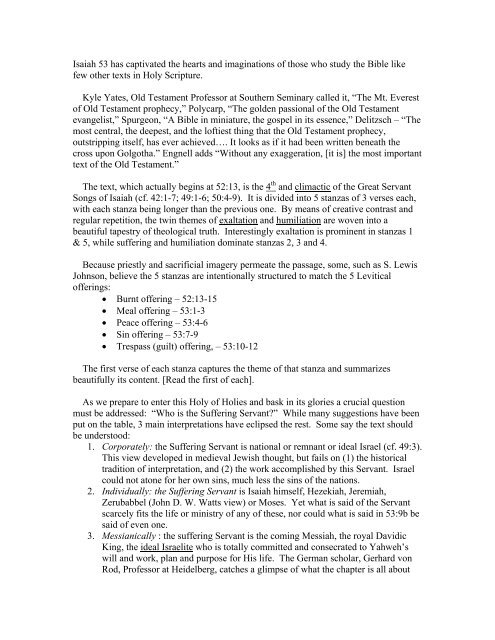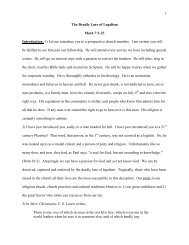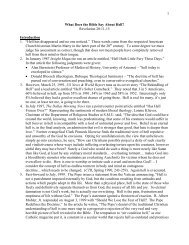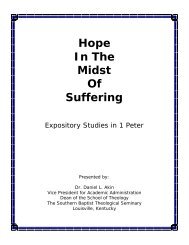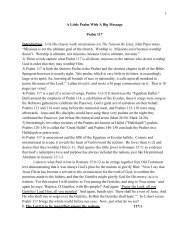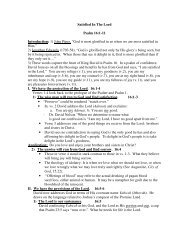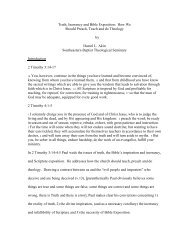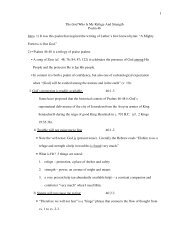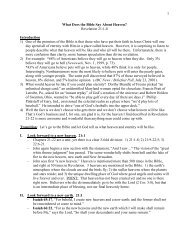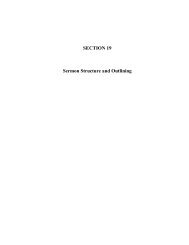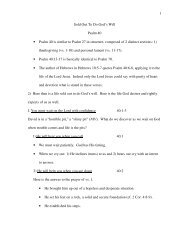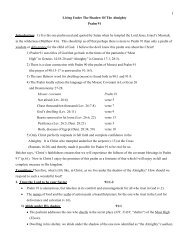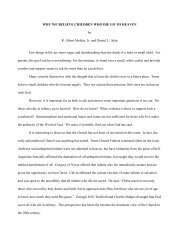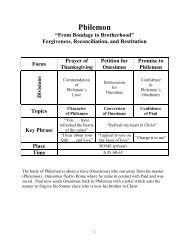Isaiah 53 has captivated the hearts and imaginations ... - Daniel Akin
Isaiah 53 has captivated the hearts and imaginations ... - Daniel Akin
Isaiah 53 has captivated the hearts and imaginations ... - Daniel Akin
You also want an ePaper? Increase the reach of your titles
YUMPU automatically turns print PDFs into web optimized ePapers that Google loves.
<strong>Isaiah</strong> <strong>53</strong> <strong>has</strong> <strong>captivated</strong> <strong>the</strong> <strong>hearts</strong> <strong>and</strong> <strong>imaginations</strong> of those who study <strong>the</strong> Bible likefew o<strong>the</strong>r texts in Holy Scripture.Kyle Yates, Old Testament Professor at Sou<strong>the</strong>rn Seminary called it, “The Mt. Everestof Old Testament prophecy,” Polycarp, “The golden passional of <strong>the</strong> Old Testamentevangelist,” Spurgeon, “A Bible in miniature, <strong>the</strong> gospel in its essence,” Delitzsch – “Themost central, <strong>the</strong> deepest, <strong>and</strong> <strong>the</strong> loftiest thing that <strong>the</strong> Old Testament prophecy,outstripping itself, <strong>has</strong> ever achieved…. It looks as if it had been written beneath <strong>the</strong>cross upon Golgotha.” Engnell adds “Without any exaggeration, [it is] <strong>the</strong> most importanttext of <strong>the</strong> Old Testament.”The text, which actually begins at 52:13, is <strong>the</strong> 4 th <strong>and</strong> climactic of <strong>the</strong> Great ServantSongs of <strong>Isaiah</strong> (cf. 42:1-7; 49:1-6; 50:4-9). It is divided into 5 stanzas of 3 verses each,with each stanza being longer than <strong>the</strong> previous one. By means of creative contrast <strong>and</strong>regular repetition, <strong>the</strong> twin <strong>the</strong>mes of exaltation <strong>and</strong> humiliation are woven into abeautiful tapestry of <strong>the</strong>ological truth. Interestingly exaltation is prominent in stanzas 1& 5, while suffering <strong>and</strong> humiliation dominate stanzas 2, 3 <strong>and</strong> 4.Because priestly <strong>and</strong> sacrificial imagery permeate <strong>the</strong> passage, some, such as S. LewisJohnson, believe <strong>the</strong> 5 stanzas are intentionally structured to match <strong>the</strong> 5 Leviticalofferings:• Burnt offering – 52:13-15• Meal offering – <strong>53</strong>:1-3• Peace offering – <strong>53</strong>:4-6• Sin offering – <strong>53</strong>:7-9• Trespass (guilt) offering, – <strong>53</strong>:10-12The first verse of each stanza captures <strong>the</strong> <strong>the</strong>me of that stanza <strong>and</strong> summarizesbeautifully its content. [Read <strong>the</strong> first of each].As we prepare to enter this Holy of Holies <strong>and</strong> bask in its glories a crucial questionmust be addressed: “Who is <strong>the</strong> Suffering Servant?” While many suggestions have beenput on <strong>the</strong> table, 3 main interpretations have eclipsed <strong>the</strong> rest. Some say <strong>the</strong> text shouldbe understood:1. Corporately: <strong>the</strong> Suffering Servant is national or remnant or ideal Israel (cf. 49:3).This view developed in medieval Jewish thought, but fails on (1) <strong>the</strong> historicaltradition of interpretation, <strong>and</strong> (2) <strong>the</strong> work accomplished by this Servant. Israelcould not atone for her own sins, much less <strong>the</strong> sins of <strong>the</strong> nations.2. Individually: <strong>the</strong> Suffering Servant is <strong>Isaiah</strong> himself, Hezekiah, Jeremiah,Zerubabbel (John D. W. Watts view) or Moses. Yet what is said of <strong>the</strong> Servantscarcely fits <strong>the</strong> life or ministry of any of <strong>the</strong>se, nor could what is said in <strong>53</strong>:9b besaid of even one.3. Messianically : <strong>the</strong> suffering Servant is <strong>the</strong> coming Messiah, <strong>the</strong> royal DavidicKing, <strong>the</strong> ideal Israelite who is totally committed <strong>and</strong> consecrated to Yahweh’swill <strong>and</strong> work, plan <strong>and</strong> purpose for His life. The German scholar, Gerhard vonRod, Professor at Heidelberg, catches a glimpse of what <strong>the</strong> chapter is all about
“We have turned, everyone, to his own way.” Each of us <strong>has</strong> chosen our way overGod’s way. “And <strong>the</strong> Lord <strong>has</strong> laid on Him” (caused to l<strong>and</strong>, caused to fall) “<strong>the</strong> iniquityof us all.”Jesus in John 10 taught us that “<strong>the</strong> Good Shepherd lays down His life for <strong>the</strong> sheep.”Could <strong>Isaiah</strong> <strong>53</strong>:6 provide, at least in part, this image to explain His ministry?Since verse 4 we have been immersed in <strong>the</strong> language of sacrifice <strong>and</strong> atonement, ofsubstitution <strong>and</strong> salvation.1) Recall <strong>the</strong> contrast between He <strong>and</strong> our.2) Examine <strong>the</strong> words descriptive of our sin: griefs, sorrows, transgressions,iniquities, gone astray, his own way.3) Meditate on <strong>the</strong> words of His work: borne, carried, wounded, bruised,punishment, stripes, laid on Him (<strong>and</strong> by <strong>the</strong> Lord!).The language of substitution, of penal substitution could not be clearer. I amconvinced that <strong>the</strong>ologians, myself included, should jettison <strong>the</strong> language of “<strong>the</strong> <strong>the</strong>oryof penal substitution.” There is nothing <strong>the</strong>oretical about it at all. It is biblical through<strong>and</strong> through.Feminist <strong>the</strong>ologian Delores Williams could not be more wrong when she says, “<strong>the</strong>reis nothing divine in <strong>the</strong> blood of <strong>the</strong> cross.”John Spong is without hope when he says, “I do not want a God who would kill Hisown Son.”No, Calvin saw it correctly when he wrote, “In order to interpose between us <strong>and</strong>God’s anger, <strong>and</strong> satisfy His righteous judgment, it was necessary that He [<strong>the</strong> Son]should feel <strong>the</strong> weight of divine vengeance.”Theories of Example, Moral Influence, Governmental, <strong>and</strong> Christus Victor all have<strong>the</strong>ir place in a holistic <strong>the</strong>ology of atonement, but as Paige Patterson well says, “nei<strong>the</strong>rgood example nor moral influence ever gets men to God <strong>and</strong> to heaven. Sin <strong>and</strong> itspenalty must be addressed. The primary significance of <strong>the</strong> atonement from which allo<strong>the</strong>r meanings draw <strong>the</strong>ir dynamic is that of penal substitution” (CTR 3-2, 1989, p. 326).He suffered in my place. He paid <strong>the</strong> penalty I owed.What grace, O Lord, <strong>and</strong> beauty shone around Thy steps below!What patient love was seen in all Thy life <strong>and</strong> death of woe!Forever on Thy burdened heart a weight of sorrow hung;Yet no ungentle, murmuring word escaped Thy silent tongue.Thy foes might hate, despise, revile; Thy friends unfaithful prove;Unwearied in forgiveness still, Thy heart could only love.IV. See <strong>the</strong> Servant’s Submission (<strong>53</strong>:7-9)Here is <strong>the</strong> exemplary dimension of <strong>the</strong> Servant’s work. The Apostle Peter accuratelydraws upon this aspect of Christ’s work in I Peter 2:18-25.1. He was submissive in His silence (<strong>53</strong>:7). He was “oppressed” (harsh,physical treatment at <strong>the</strong> h<strong>and</strong>s of o<strong>the</strong>rs) <strong>and</strong> “afflicted” (or “He was humblingHimself”), “yet He opened not His mouth.” He does not protest His treatment. He doesnot resent His destiny.“He was led as a lamb to <strong>the</strong> slaughter <strong>and</strong> as a sheep … is silent.”
“So He opened not His mouth” is repeated for emp<strong>has</strong>is. The <strong>the</strong>me of “<strong>the</strong> lamb”runs from Genesis to Revelation (Isaac, Genesis 22; Passover, Exodus 12; Jesus, John1:29; <strong>the</strong> Warrior Lamb, Revelation 5:6).No doubt this is <strong>the</strong> verse that formed <strong>the</strong> basis of <strong>the</strong> declaration by John <strong>the</strong> Baptist,“Behold, <strong>the</strong> Lamb of God who takes away <strong>the</strong> sin of <strong>the</strong> world” (John 1:29).2. He was submissive in His suffering (<strong>53</strong>:8). “Taken from prison <strong>and</strong> fromjudgment” teaches that an unfair <strong>and</strong> unjust trial was His. His treatment was wrong frombeginning to end.“Who will declare His generation? For He was cut off from <strong>the</strong> l<strong>and</strong> of <strong>the</strong> living.”The Servant of <strong>the</strong> Lord is executed with no offspring left behind. In that day to diechildless meant you were cursed by God <strong>and</strong> your life was virtually useless. Has anyonegiven a second thought to what this terrible injustice means?But again we need to see “<strong>the</strong> rest of <strong>the</strong> story.”“For <strong>the</strong> transgressions of My people He was stricken” (<strong>the</strong> blow is His, cf. v. 4). For<strong>the</strong> transgressions of <strong>the</strong> people, a blow <strong>has</strong> fallen on <strong>the</strong> Servant. That which shouldhave hit me hit Him. That which should have hit you hit Him.3. He was submissive in His shame (<strong>53</strong>:9). “He was assigned a grave with<strong>the</strong> wicked <strong>and</strong> with <strong>the</strong> rich in His death” is a form of Hebrew parallelism <strong>and</strong> carries <strong>the</strong>idea that “He was buried among <strong>the</strong> wicked rich.” He was a good man yet He is buriedwith <strong>the</strong> wicked. He was a poor man yet He is buried with <strong>the</strong> wealthy. It should nothave ended this way. “He had done no violence. Nor was any deceit found in Hismouth.” Both by word <strong>and</strong> deed His life should have turned out differently. This is howwe, from our human perspective, would see it. Oh, but how different is <strong>the</strong> perspective ofheaven! “He died like a criminal but was buried like a prince.” Here is a hint that thingsmay not be as <strong>the</strong>y seem.Why Was He Silent?Why is He silent when just a word would slay His accusers all?Why does He meekly bear <strong>the</strong>ir taunts when angels await His call?“He was made sin,” my sin He bore upon <strong>the</strong> accursed tree.And sin <strong>has</strong> no defense to offer at all, His silence was for me!V. See <strong>the</strong> Servant’s Salvation (<strong>53</strong>:10-12)The death of <strong>the</strong> Servant was not a murder or a martyrdom. It was nothing less than adivine appointment! Spurgeon was exactly right, “<strong>the</strong> blood stained Scriptures werewritten by <strong>the</strong> Lord as much as any o<strong>the</strong>r!” Who killed Jesus? Pilate, Herod, <strong>the</strong> Jews,<strong>the</strong> Romans, you <strong>and</strong> me? We all played our part, but ultimately it was God whosacrificed His Son.1. It is purposed by <strong>the</strong> Lord (<strong>53</strong>:10). The servant was <strong>the</strong> right person at<strong>the</strong> right time at <strong>the</strong> right place following <strong>the</strong> right plan. “It pleased <strong>the</strong> Lord to crushHim,” better “it was <strong>the</strong> Lord’s will” (NIV). God wanted this to happen. It was noaccident, it was a divine appointment.It was His Fa<strong>the</strong>r who “put Him to grief” (sickness) “making His soul a guilt offeringfor sin” (Leviticus 5:1-19). It was God’s will that <strong>the</strong> Servant become an atoningsacrifice for sin.
Now we see that His death was not <strong>the</strong> end. If verse 10b does not teach resurrection,its glorious shadow looms large just behind us. The Servant’s life <strong>and</strong> sacrifice was not awaste, a loss, after all. In fact, “He will see His seed (offspring), His days will beprolonged” (leng<strong>the</strong>ned) <strong>and</strong> <strong>the</strong> best of all: “<strong>the</strong> pleasure” (will, desire) “of <strong>the</strong> Lordshall prosper” (be accomplished) “in His h<strong>and</strong>.” Yes He was “bruised” by God, but He isalso “blessed” by God. This is purposed by <strong>the</strong> Lord.2. It is pleasing to <strong>the</strong> servant (<strong>53</strong>:11). Verse 11 should read, “From <strong>the</strong>anguish of His soul, he will see light, <strong>and</strong> be satisfied by His knowledge. My righteousServant shall justify many, bearing <strong>the</strong>ir iniquities.” It <strong>the</strong>matically links with Jeremiah23:5-6 <strong>and</strong> <strong>the</strong> righteous Davidic branch, a king who will reign, prosper, <strong>and</strong> executejudgment <strong>and</strong> righteousness in <strong>the</strong> earth. The Servant can rejoice. Though <strong>the</strong> cost wasgreat <strong>the</strong> outcome is greater still. Anguish is replaced by joy. Darkness is vanquished bylight. The Servant is satisfied by <strong>the</strong> knowledge of what <strong>has</strong> been achieved. The Servant,by what He did, will make guilty persons righteous. And what did He do? He bore <strong>the</strong>iriniquities.3. It is provided for many (<strong>53</strong>:12). The picture in verse 12 is that of a victoryparade with <strong>the</strong> Servant marching out front in <strong>the</strong> role of conqueror, bringinghome <strong>the</strong> spoils of battle. God will give <strong>the</strong> Servant those He redeemed aswell as those who rejected Him. Indeed, every knee will bow! (Philippians2:10-11). Why does He deserve such honor? <strong>Isaiah</strong> brings it to a beautiful<strong>and</strong> appropriate summation:• Because He poured out His soul unto death.• He was numbered (listed) with sinners.• He bore <strong>the</strong> sin of many.• He made intercession for <strong>the</strong> transgressors.(“For <strong>the</strong>ir rebellions He intervened” Oswalt, 399).He died not just with sinners. He died for sinners.Dan Block wonderfully puts it all toge<strong>the</strong>r, “<strong>the</strong> messianic hope is a single line thatbegins in broadest terms with God’s promise of victory over <strong>the</strong> serpent through “<strong>the</strong>seed of woman” (Genesis 3:15), <strong>the</strong>n is narrowed successively to <strong>the</strong> seed of Abraham(Genesis 22:18), <strong>the</strong> tribe of Judah (Genesis 49:10), <strong>the</strong> stem of Jesse (<strong>Isaiah</strong> 11:1), <strong>the</strong>house/dynasty of David (2 Samuel 7) <strong>and</strong> finally <strong>the</strong> suffering <strong>and</strong> slain servant ofYahweh (<strong>Isaiah</strong> <strong>53</strong>).”Rejection was His. Acceptance is ours.The wounding was His. The healing is ours.The stripes were His. The salvation is ours.The price paid was His. The forgiveness is ours.The death was His. But life is ours.Hallelujah! What a Savior!
Conclusion“O Sacred Head Now Wounded”by Bernard of Clairvaux (1090 – 11<strong>53</strong>)O sacred Head, now wounded,with grief <strong>and</strong> shame weighed down.Now scornfully surrounded, with thorns your only crown.How pale you are with anguish, with sorrow, abuse <strong>and</strong> scorn!How does your visage languish, which once was bright as morn!What you, my Lord have suffered, was all for sinners’ gain.Mine, mine was <strong>the</strong> transgression, but yours <strong>the</strong> deadly pain.O, here I fall, my Savior! It’s I who deserve your place.But you showed me your favor! It is all because of grace.I thank God for <strong>Isaiah</strong>’s Suffering Servant. I thank God for Jesus!What a Servant. What a Savior!


